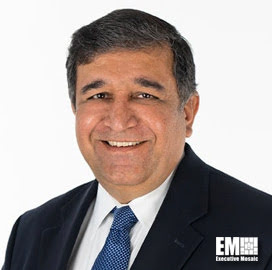
Harish Luthra
CEO
SAP NS2
Member Profile: Harish Luthra, CEO of SAP NS2
Harish Luthra, CEO of SAP National Security Services (SAP NS2), recently spoke with the Potomac Officers Club to share his thoughts on driving constant innovation in the GovCon landscape, how management styles contribute to the success of an organization and what changes could be made in the federal government to better facilitate progress. Luthra has been with SAP for more than two decades, and he’s been the head of SAP NS2 since March 2022.
What can you tell us about your background and how you’ve been able to adapt to the ever-changing challenges of the federal landscape over the course of your career?
“I have been engaged with the federal customer base for more than 30 years, the last 25 with SAP and SAP National Security Services (SAP NS2®). I started off as a functional consultant and then progressed to project management and leadership positions. I have experienced the evolution of our customers’ expectations as they have migrated to the cloud and adopted SAP innovation. Today, they expect seamless integration, real-time data availability and reliable security. Over the last decade, cybersecurity has been at the forefront as we all are moving to the cloud and cloud solutions.
If you are always leading with security and compliance, you will accomplish the most critical task: driving constant innovation without compromise. As leaders, it’s critical we embrace lifelong learning and adaptability to meet the ever-changing challenges of the federal landscape. Even as a CEO, I’ve made it a priority to understand the full picture — from security controls to emerging government policies. We can never stop anticipating the needs of our customers.”
How do you view the federal landscape compared to the commercial realm?
“As I moved into management and leadership, I realized that my career serving the public sector was different than it would have been in the commercial realm. There is a greater sense of purpose in our industry, a mindset that goes beyond making a profit. Many of our customers are in the business of national security, which means failure is not an option. Every day, we enable them to make mission-critical decisions with accuracy and speed. I’m fortunate to have a career that contributes to society in such a positive way.
Gone are the days where profit is the only measure of success. In the next era of management, leaders of government and business organizations need to be prepared to respond to changing socio-economic demands and consider a triple-bottom line of purpose, people and profit.
I have been humbled and impressed with the selfless service of the government personnel I have interacted with over the years. I truly admire the unique, altruistic values which drive them forward, and this has changed how I view my decisions. I’m honored to be surrounded by so many inspiring people as my customers and colleagues.”
How would you describe your management style and core values towards building a winning culture?
“I have been influenced by Hubert Joly’s (former CEO of Best Buy) management philosophy, which is that diversity and inclusion should not be an afterthought but should be part of the management DNA. It is so critical to have diversity of thought at every level of the organization. Numerous studies show that diverse teams are more productive and innovative, and that’s what I have personally experienced. Our customer’s teams are becoming more diverse, and we need to do the same to understand and be close to the values of our customers.
Also related to my management style, I believe it’s critical to invest in people and their ongoing professional development. Our customers are digitizing and transforming their organizations and businesses rapidly, and we need to engage, enable and empower our people to do the same. As a leader, it’s my job to create a work environment that enables lifelong learning. And I encourage everyone in the organization to embrace a growth mindset.
When it comes to core values, I would say empathy, accountability and adaptability are essential to building great teams and driving success in such a competitive industry.”
If you were given free reign to enact changes in the federal landscape, what are the first three changes you would implement and why?
“First, I would encourage every customer, especially in the U.S. public sector and highly regulated industries, to consider the benefits of sovereign cloud — a cloud computing architecture that is built to manage data, operations and infrastructure in compliance with local laws and regulations. When agencies increase their investments in sovereign cloud initiatives, more of their data and operations remain residential. In other words, their cloud environment only exists within a given region, does not leave the region or provider and is not accessible by foreign jurisdictions and actors. For many organizations in government and regulated industries, adherence to U.S.-based cloud operation and data compliance laws has become a necessary requirement to safeguard their cloud environments against foreign access.
Secondly, I would encourage better collaboration between the public and private sectors. At SAP NS2, we often say our biggest vulnerability and missed opportunity is the inability of public and private entities to form a unified front against cyberwar. It is essential from both a defensive and offensive perspective that the government and private sectors share cyber risk and incident information in real time. Take the critical infrastructure sectors, for example, which have a lot in common. The controls to manage the systems and processes are very similar. The supply chains for the government extend into private companies. If I were given free reign, I would like the public-private partnership to be extended for the systems and utilize the available cloud solutions and technologies to share information and make more informed decisions faster. What if the DOD and the Defense Industrial Base could share the same platforms for acquisition, planning and execution? This could revolutionize real-time demand planning and supply chain visibility.
Lastly, I would refine the acquisition process. Federal workloads have steadily moved to the cloud, initially under a federal cloud-first policy and now under a cloud-smart policy. But the acquisition process hasn’t changed much and presents challenges, specifically in how the federal government evaluates proposals. Many prospective customers are drawn to the Lowest Price Technically Acceptable (LPTA) option. When it comes to your digital transformation, you don’t want the lowest cost solution, you want the more innovative solution that is still driving you forward 10 years down the line. The traditional methods of LPTA and risk management may stifle proposed innovation from the private sector. Our customers and their COTRs need more transparency and more open lines of communication throughout the entire acquisition process. As new platforms and technical solutions are coming forward, it will be good for the contracting processes to encourage the proposal of innovative solutions versus playing it safe to win the contracts. We need to be able to find the right equilibrium between innovation and acquisition integrity. And finally, SLAs are not the only way to measure success — we need to highlight other factors, like ease of use and the model for ongoing customer success.”

Category: Executive Profiles




